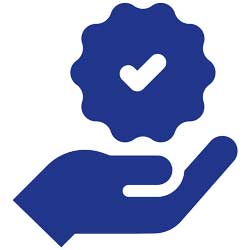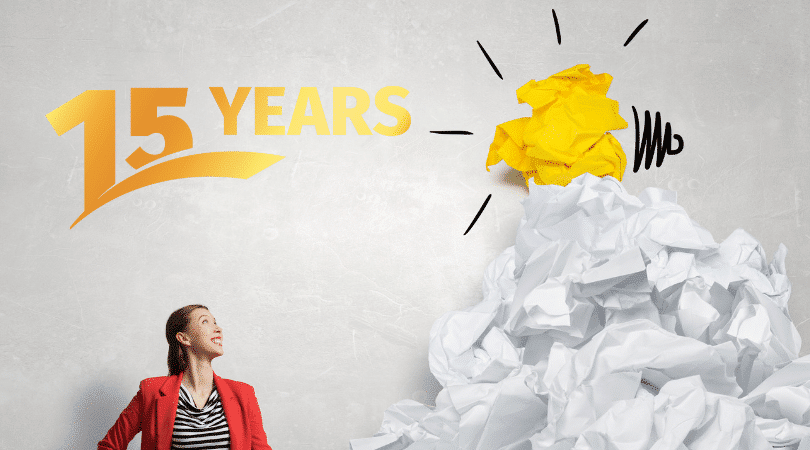Fifteen years ago, on the 1st of December 2003, I opened the doors to my fledgling small business.
Running a small business wasn’t something I grew up dreaming I would be doing. It isn’t something I discussed with my career counsellor (in my case an ancient nun with wobbly dentures who insisted on furtively passing me tattered brochures on becoming a teacher).
Running a small business certainly wasn’t something I answered my Great Aunt Gerda with when she would ask for the thousandth time, “What do you want to be when you grow up?”
Most small business owners’ sort of just fall into it, and then rotate through being incredibly surprised, baffled and impressed with our bravery/foolhardiness.
I am no exception.
In my case, my leap into business happened when I was off from my senior government role on stress leave created from attempting to implement one too many top-down imposed organisational change processes in a dysfunctional department while juggling a feral marriage breakup.
My brain was totally fried, my savings enough to feed a sparrow for a few days (as long as it was anorexic), and I had never been or knew anyone who had been in a small business.
So of course, starting a small business seemed like a logical thing to do!
I had no idea what I was doing, and made every mistake under the sun, including some right-royal, rip-snorting foul-ups and disasters where I glowed with shame and self-approbation for months. (If you like a bit of self-flagellation, then this post of mine about Epic Fails sheds light on some of my failures).
I also had many truly amazing, unimaginable moments of bliss, joy and contentment, coupled with the odd wonderful successes, made even more special through the making of lifelong friends along the way.
Lessons Learned
So, what have I learned from my entrepreneurial journey?
I have always enjoyed listening to the lessons learned from other business owners over the years. So here, are just a few of the lessons I have learned from the past 15 years in small business.

Be Your Brand
Paul Holstein from Brandrally gave me this particular piece of business advice many years ago, and it has guided my business ever since.
What does your business brand stand for? What do you help clients do or achieve or feel? How do you embed your brand and way of doing things into every tiny interaction with your clients?
Ask yourself, does every tiny part of my business reflect my brand?
Think deeper than colours and logos. With this question you want to work out if you are walking your talk in your business.
So many therapists I see look permanently ill or unhappy. So many accountants are bad at paying their bills and managing their finances. So many consultants who sell how to systematise a business are floundering in email overload and lost paperwork.
True success comes when you can see your brand reflected in everything you do: from each email you write to clients, to how you speak on the phone or how you serve customers at your counter.
To make it tangible: Let’s say you are a mechanic and your brand offering is to provide “a friendly, knowledgeable service using quality parts and equipment”. Every time that a team member answers the phone, are they warm and happy to share helpful information? Do you give your clients tip sheets when they leave on how to check their oil and water? Are your computers modern and running fully updated security and other programs? Do you specifically hire staff with a friendly attitude?
Let’s say you are an accountant and your brand offering is that “you take the stress out of tax time by implementing easy to follow financial systems and processes in a business”. Do you have a standardised process and checklist for new client intakes? Do you have automated follow-ups to all of your clients on the lead up to key ATO deadlines to remind them of what to do? Do you monitor your clients and proactively call to check that they are on track?
Being your brand, when taken to its logical conclusion, is business transforming and yet is one of the hardest things you can do in your business.
Trust, But Get A Deposit
You can’t buy groceries with goodwill and friendship. After a “friend” skipped on a project and left me with a $40,000 bad debt to write off, I learned the importance of always having legally drafted terms and conditions, formally signed contracts and always getting a 50% deposit up front.
Rather than not trusting people ever again, I learned to trust but make the formal part of the process systematised to get myself out of the way, (otherwise I will sabotage myself and skip a few formal steps which then come back to bite me).
How I do this is that I moved to a cloud-based proposal program called Proposify, and I attach my T&Cs (drafted by my wonderful lawyer) to the proposal.
Once we have electronic sign off for the project, the system is linked to my Xero, and it auto-generates a draft commencement invoice.
This means every I is dotted, and t crossed, and I can’t get in the way of my own success.

Confidence Controls Income
After working with thousands of small business owners over the years, I observed an interesting correlation: Confidence trumps skill every time.
It doesn’t matter how intensely skilled you are; if you don’t have self-confidence in your ability to succeed, your income will always be limited.
A case in point is two different consultants I worked with. The first was a woman and worked with start-up Mumpreneurs helping them with their business plans. She was intensely skilled, warm, wonderful and made a massive difference to her clients. Yet, she doubted her ability and the market’s ability to pay, so only charged $300 for the process.
The second was a bloke and helped start-up businesses with their business plans. He knew his stuff and made a massive difference to his clients. He was super-confident in his ability and believed his market had the ability to pay, so charged his clients $3000 for the process.
Same task. Same outcome for the clients. The only difference was confidence and belief.
What do you believe about yourself and your market?
I have learned that on days where my confidence is wobbly, those are the days I cut my rates without being asked.
How I have worked around the confidence problem is to create a schedule of fees that lives in a folder by my computer. I also publish my rates on my website and have my rates included in my proposal templates (which then take a conscious effort to change).
In other words, I have created a system to get myself out of my way (again) on the days when I am emotionally weak, and my confidence in myself is as strong as a newborn giraffe.
Can you see a pattern here between this and the last point? If you have a weakness, either hire someone to fill your gap or create a system to automate your process, so your weakness is patched
Listen to Your Gut
Have you ever talked yourself into working with a client or supplier just for the money or the exposure or the shiny portfolio brag, even though your gut was screaming to run away as fast as you can?
Did you add on a massive PIA loading (pain in the a** loading) to try and make working with that client more palatable?
How did that work out for you?
Every single time I have overridden my gut I have deeply regretted it. The client has turned out to be a non-payer, rude or dismissive, a hundred phone calls a day person or someone who constantly changed their mind depending on which way the breeze is blowing.
If your gut says no, then either do more digging to find out what the concern is, or simply walk away. Refer the client to one of your colleagues who may be a better match for them.
Life’s too short to work with people you don’t like. After all, that is one of the perks of being in small business – the freedom to choose who you work with.

Implementation Is Far More Important Than Knowledge
How many books, courses and blog posts have you read to help you in your small business? How many have you actually implemented?
If knowledge were all it took to be a success, librarians would be richer than Bill Gates.
Knowledge is not power – Implementation is power.
If you implement a thousand ideas, and even just a handful of them bear fruit, your business will succeed in ways you could never have imagined.
The people who sit and wait for the perfect moment or seek the perfect missing piece of information get left behind on the couch, while those who are bold in their implementation get going and achieve.
This is not about hustling till it hurts (which always sounded like it would chafe worse than a pair of the wrong sized stockings worn on a marathon shopping expedition in mid-summer). This is more about simply doing one thing at a time until completion, monitoring to see how it went and then doing another thing until completion.
Read more about why you shouldn’t wait for perfect.
Communicate In A Way People Can Hear
Have you noticed that some people raise their voice and yell when trying to talk with a person who speaks another language, as if angrily yelling makes thing easier to understand?
Do you hate it when someone speaks in jargon or geek speak to you, and you struggle to keep up with what they are saying?
One of the biggest lessons I learned through my work with SEO (search engine optimisation), was to work out the words that people used when they looked for businesses or services like yours and use those words on your website and in your marketing, so that you are communicating in a way that people can hear.
Don’t say “electrical contractor” if your clients are primarily mums and dads looking for electrical work in their residential home. They type “electrician” into their search engines and have no idea what you are jabbering on about when you yell, “I am really an electrical contractor”. Use their words, and you help them to understand what you offer and therefore they are more likely to buy.
If you have people checking out your business either online or in person, but they are not buying, you most likely have a communication problem. Your words are not clear, your offer is not clear, or your reasons for people to buy are not clear.
If things are not communicated in a way that people can hear and understand, they will click away and not buy from you. Speak in your client’s language.

Don’t Turn a Firehose on a Thirsty Person
Tad Hargrave is someone whose insights I deeply value. He taught me that when you are a natural giver, you want to share every piece of wisdom that you have accumulated with people who ask for help.
He also taught that this is an incredibly cruel thing to do.
When someone is thirsty, do you turn on a firehose and point it at their face or do you pour them a glass of water?
What if in your zeal to provide massive value you were actually hurting? What if giving too much too fast was actually a deeply cruel and painful act and the total antithesis of caring and helping?
His thinking is to be gentle with people and allow them to drink of the knowledge you are offering at their own pace. By doing this, you set them up for success rather than feeling overwhelmed or drowning them with kindness.
Last thoughts
The last 15 years have been some of the most challenging, thrilling, white-knuckle terrifying and brilliant years of my life.
It has been like getting on an extreme roller coaster and forgetting to buckle in: holding on with by my fingernails at times while at other times shrieking in exhilaration.
Whew, what a ride!
I want to personally thank you for being a part of my journey, and for reading and sharing my musings on life and business.
If you like what you read, please share our posts with your friends or colleagues. We deeply appreciate your support!



